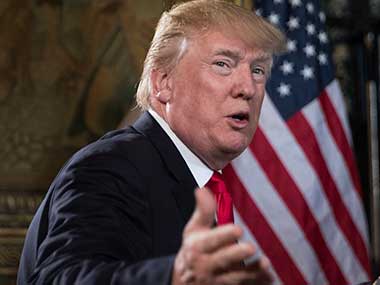The United States, accusing Pakistan of harbouring terrorist organisations and failing to act decisively against them, has decided to suspend more than $1.15 billion in security assistance to the country. The move comes three days after US president Donald Trump tweeted saying Pakistan has given the US nothing but "lies and deceit" and provided "safe haven" to terrorists in return for $33 billion aid over the last 15 years.
Of the $1.15 billion fund that was suspended, $255 million is in Foreign Military Funding (FMF) for Fiscal Year 2016 as mandated by Congress. In addition, the Department of Defence has suspended the entire $900 million of the Coalition Support Fund (CSF) for Fiscal Year 2017.
This is in stark contrast to the generous aid Pakistan has received from the US over the years, emerging as one of the biggest recipients of US aid because of its role as a regional ally in the US-led military intervention in Afghanistan. However, the withholding of the two funds isn't a new development. Over the years, and even earlier this year, Washington had stopped funding Pakistan, saying the latter hadn't done enough to justify the funding.
Foreign Military Financing
Foreign Military Financing refers to congressionally appropriated grants given to foreign governments to finance the purchase of American-made weapons, services and training. It was instituted in 1950 and has, in the last 67 years, contributed over $91 billion to militaries around the world.
A generous beneficiary of this fund was Pakistan, but it will be slashed by $255 million. However, as reported by The New York Times in December last year, the Trump administration was already frustrated by Pakistan and its "intransigence toward confronting the terrorist networks that operate there".
Furthermore, Trump had already announced way back in August that Islamabad can access the Foreign Military Fund assigned to it "only if it does more to crack down on internal terror networks".
At the time, while announcing his new strategy for the war in Afghanistan, Trump had harsh words to say about Pakistan. "We can no longer be silent about Pakistan's safe havens for terrorist organisations, the Taliban, and other groups that pose a threat to the region and beyond," Trump had said.
In the four months that passed between the two announcements, Islamabad had clearly done little to suggest it was taking Trump's threats seriously. The New York Times article quoted Husain Haqqani, Pakistan's former ambassador to Washington, as saying Islamabad can "withstand" a cut-off in American aid.
The country's military, he said, still views its accommodation of the Haqqani network as being in its security interest. The only way to overcome that is if the Trump administration pursues other, more punishing measures, "either by imposing targeted sanctions on the government or by removing it from the list of non-NATO allies".
"Pakistan can withstand a cutoff in American aid. It would have to be followed by something else to make Pakistan believe that Trump means business," Haqqani said.
Indeed, as reported by Foreign Policy magazine, Pakistan holds much leverage over the US, and the decision to withhold aid to Islamabad cannot be taken so easily. Pakistan has the fastest growing nuclear programme in the world, and given the vast proliferation of terrorist organisations on its soil, Washington will be very concerned about these groups getting their hands on deadly nuclear weapons. The demise of a strong Pakistan State will play into the terrorists' hands, and not Washington's.
And secondly, the Afghanistan war. The US is in an "unwinnable" situation in Afghanistan, as noted by Foreign Policy, and it needs to continue engaging Pakistan as long as it intends to remain engaged in Afghanistan. "US policy in Afghanistan requires a port with road or rail access to Afghanistan. This administration — like each one before — has cast its lot with Pakistan. And it will confront the same failures as its predecessors. Logistics will beat strategy every time," it said.
Coalition Support Funds
The other component of the funds going from Washington towards Islamabad is the Coalition Support Fund (CSF). At $900 billion a year, this is the bigger chunk of US' grants, and is meant to reimburse Pakistan for "operational and logistical support of US-led counter-terrorism operations" in the region. What this essentially means is that the US will use Pakistan's ports and airstrips and land territory to host its troops who are engaged in the war on terror in Afghanistan.
Pakistan has used these funds to deploy troops along its militancy-hit northwest region that borders Afghanistan. The CSF funds also compensate Pakistan for allowing the US-led coalition forces access its airfields and ports to provide supplies and logistics in their deployment in Afghanistan, said an IndiaSpend report.
Pakistan is one of the largest recipients of the fund and has received $14 billion since 2002. But for the past two years, the US Congress has imposed conditions on disbursal of money under the fund.
In May, when the US Congress proposed the sum for the Fiscal Year 2018, it had said it recognises the "significant sacrifices the Pakistan military has made in the fight against terrorism". "The FY 2018 budget proposal seeks $800 million in CSF for Pakistan. The CSF authority is not security assistance, but reimbursements to key cooperating nations for logistical, military, and other support provided to US combat operations," Adam Stump, defence department spokesman for Afghanistan, Pakistan and Central Asia was quoted as saying by PTI in May this year.
However, like with the FMF, even the CSF was halted shortly after its approval. As reported by The Indian Express in July, the decision to withhold the fund came after Defence Secretary James Mattis' report that Islamabad failed to take "sufficient action" against the Haqqani Network.
"The funds ($350 million) could not be released to the government of Pakistan at this time because the secretary could not certify that Pakistan has taken sufficient action against the Haqqani Network as per the requirement in the Fiscal Year 2016 NDAA," Stump said.
With inputs from agencies
Published Date: Jan 05, 2018 11:24 AM | Updated Date: Jan 05, 2018 11:24 AM


















